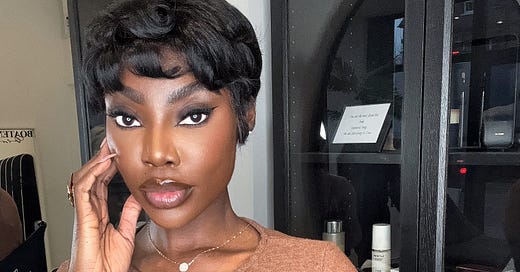I’ll be honest, I never really gave much thought to IVF, fertility struggles, or conditions like endometriosis. That was until I started hearing more and more about them from the women who visited my aesthetic clinic.
What started as lighthearted chats over microblading and brow lamination appointments often turned into heartfelt, emotional conversations about their personal journeys with fertility.
That’s when it hit me: as a society, we’re not great at talking about these issues. Worse still, misinformation and stigma are everywhere. And let’s be real, fertility struggles can be isolating. Too many people end up feeling alone, overwhelmed, and even depressed.
After hearing so many stories from these women, I knew it was time to do more than listen. It’s time to normalise this conversation, clear up some myths, and (dare I say) smash the taboo around fertility challenges.
For example, the idea that IVF is a magic, one-time fix? Spoiler alert: it’s not. Or the myth that pregnancy somehow cures endometriosis? Nope. Let’s dive into the facts, bust some myths, and open the dialogue.
Myth 1: IVF is a “quick fix”
If only it were that simple. IVF (in vitro fertilisation) often gets painted as the ultimate fertility solution, but the truth is, it’s neither instant nor guaranteed. Success depends on factors like age, health, and even luck. It can take multiple cycles and a whole lot of patience.
Myth 2: Endometriosis = instant infertility
This is a big one. Yes, endometriosis (which affects 1 in 10 women) can make conceiving more challenging, but it’s not an automatic infertility sentence. 60–70% of women with endometriosis remain fertile.
While the condition can cause scarring and inflammation in the pelvic area, many women with endometriosis go on to have children, sometimes with medical support, and sometimes without. And no, pregnancy doesn’t cure endometriosis. Symptoms may go temporarily but often return postpartum.
Myth 3: Fibroids aren’t a big deal

Think fibroids are no biggie? Think again. These non-cancerous uterine growths are surprisingly common (up to 80% of women get them) and can impact fertility. Depending on their size and location, fibroids can block fallopian tubes, disrupt the uterine lining, or interfere with embryo implantation.
The good news? They’re manageable. Surgery or medical treatments can often improve your chances of conception.
Let’s Talk About the emotional rollercoaster
Here’s the thing: fertility struggles aren’t just about biology, they’re about emotions too. The stress, isolation, and societal pressure to have kids “on time” can take a serious toll on mental health.
And it’s not like society helps. Fertility issues are still stigmatised because of outdated ideas about a woman’s purpose being tied to reproduction. Eye roll. Let’s ditch that narrative, shall we?
It’s OK to not want children. It’s OK to want children but not be able to conceive the “traditional” way. There’s no shame in it. What we need is more open dialogue, more safe spaces for sharing, and way less judgment.
The end.
Fertility isn’t a one-size-fits-all journey. Whether you’re exploring IVF, managing endometriosis, or navigating fibroids, there’s no “right” way to do it.
What matters is breaking down the myths, normalising the conversation, and kicking stigma to the curb. Whether your path includes children, medical intervention, or simply embracing life without the pressure to conceive, let’s support each other.
Because at the end of the day, we all deserve to live life on our terms.
Top 5 list:
“If they don’t give you a seat at the table, bring a folding chair” - Shirley Chisholm
• Song of the week - Jack Harlow - Hello Miss Jackson - because every girl wants a man to sing about them 🥰
•Food of the week - the festive menu at dishoom - it gives flavourrrrr
• Watch of the week - Black Dove on - Netflix - omg it’s soooo good! - had my eyes glued!
• Top buy this week - FRINGED KNIT SHAWL CAPE 49.99 GBP will have you felling cozy!
Instagram: here
LinkedIn: here






Thanks so much for spotlighting this convo! It’s so common but yet never talked about, I know so many women who are going through these struggles but it wasn’t talked about in our twenties and then when we hit late 30s, that’s when it hits! So important to create a space for these type of convos!
Loved this topic!
This is such an important topic to discuss. The lack of open conversation can make those going through it feel isolated during an already challenging experience. Thank you for shedding light on this, it’s a conversation we need to have more often!